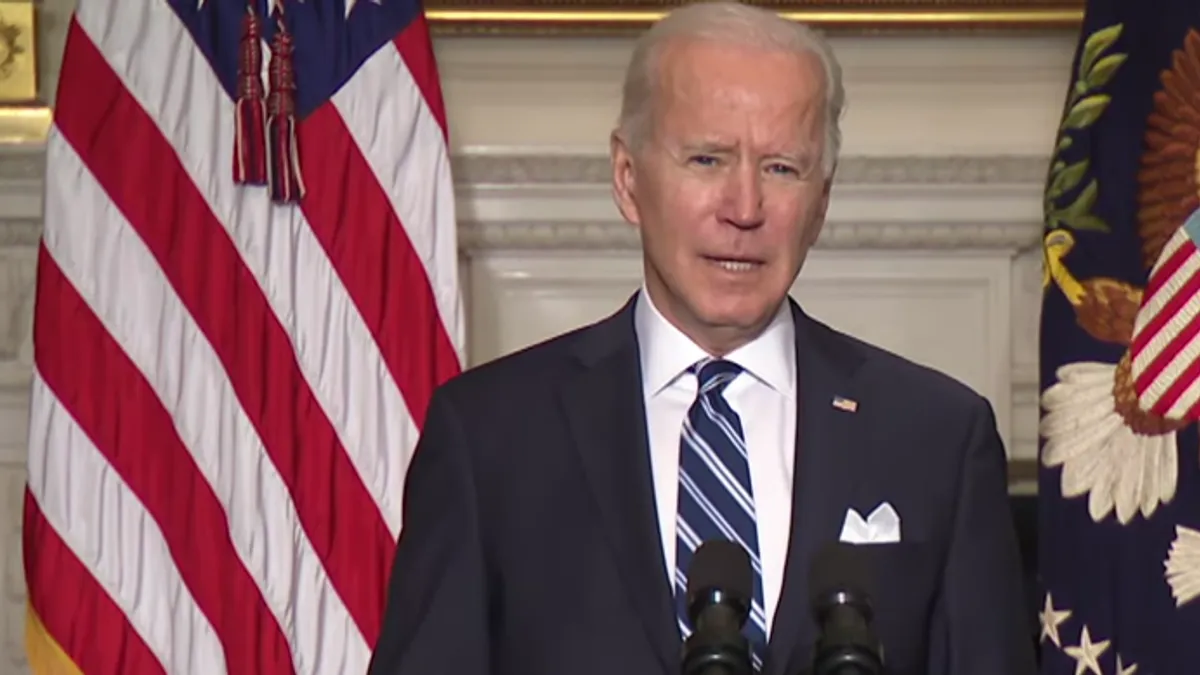Dive Brief:
- The United States will work to cut economy-wide greenhouse gas emissions by up to 52% by 2030 relative to 2005 levels, President Joe Biden announced on Thursday ahead of an Earth Day climate summit with other world leaders.
- The goal advances previous targets set by President Barack Obama, to reduce emissions up to 28% below 2005 levels by 2025. Since taking office, Biden has also rejoined the Paris climate accord, which President Donald Trump abandoned, and has advanced a jobs and infrastructure plan that hinges on eliminating economy-wide carbon emissions by 2050.
- S&P Global said utilities have a "relatively clear path to decarbonization," through renewables and storage, and warned there are risks to the global economy should efforts to address climate risks fail.
Dive Insight:
Initial reaction to the new carbon reduction target was largely positive, particularly from the clean energy community which had statements prepared for the announcement.
The new target "will help catalyze a net-zero future, which is critical to our efforts to build a strong, more equitable, and more inclusive U.S. economy,” said Ceres CEO and President Mindy Lubber.
The goal "signals a new trajectory for the energy transition," according to the Working for Advanced Transmission Technologies (WATT) Coalition.
President Biden "is also sending a clear market signal to business, one that will result in the new clean economy investments and jobs we need to reach that goal," said Bob Keefe, executive director of E2.
The new 2030 emissions target is formally known as the "nationally determined contribution" (NDC) towards the United Nations Framework Convention on Climate Change (UNFCCC). The goal was determined through a whole-of-government process that included the National Climate Task Force, which Biden formed upon re-entering the Paris accord.
The Edison Electric Institute (EEI), which represents investor-owned utilities, said meeting the NDC "will require the participation of every sector of the U.S. economy.
"We will continue to push for ambitious reductions in carbon emissions in the decade ahead," EEI President Tom Kuhn said in a statement. "At the same time, we will advocate for policies that accelerate innovation; help get critical transmission and energy grid infrastructure built more quickly," and recognize the value of electrification.
The White House, in a statement, said the country "is not waiting, the costs of delay are too great, and our nation is resolved to act now."
The Biden administration said there are "multiple paths to reach these goals, and the U.S. federal, state, local, and tribal governments have many tools available to work with civil society and the private sector to mobilize investment to meet these goals while supporting a strong economy."
The White House has set multiple aggressive goals, prompting some concern in the energy sector regarding their reasonableness. The administration is targeting an emissions-free electricity sector in 2035, which the National Rural Electric Cooperative Association has warned is "overly ambitious."
At the same time, the Interstate Natural Gas Association of America issued a statement, touting its ability to help meet the expanded interim goals for the U.S. economy overall. Where gas fits into the U.S. long-term decarbonization goal remains an open question.
"We adamantly believe that successful progress towards a clean energy future must include investments in natural gas infrastructure," INGAA President and CEO Amy Andryszak said in a statement. The group said it "encourages the Administration to embrace the foundational role that natural gas infrastructure will continue to play in reducing [greenhouse gas] emissions and ensuring reliable and affordable energy for all Americans."
ActionAid USA Executive Director Niranjali Amerasinghe said the target announced today "falls short" of the United States' fair share of decarbonization.
"We know this is not enough, and meanwhile we are still waiting for a long-term commitment on the equally important issue of international climate finance," Amerasinghe said in a statement.
New research from S&P Global Sustainable1 concludes electric utilities "have a relatively clear path to decarbonization that largely involves shifting from fossil-fuel generation to lower cost renewables and battery storage." The firm says about 1,675 businesses, 85 large investors, and more than 470 cities, have set decarbonization goals.
Failing to address climate risks could cost major global companies "up to US $283 billion in carbon pricing costs and 13% earnings at risk by 2025," S&P said.













